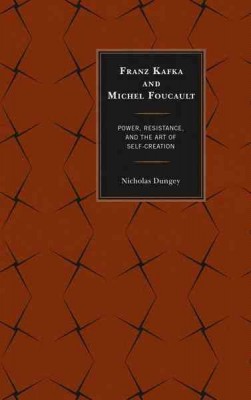| Franz Kafka and Michel Foucault: Power, Resistance, and the Art of Self-Creation Contributor(s): Dungey, Nicholas (Author) |
|
 |
ISBN: 1498550444 ISBN-13: 9781498550444 Publisher: Lexington Books OUR PRICE: $54.44 Product Type: Paperback - Other Formats Published: December 2016 |
| Additional Information |
| BISAC Categories: - Literary Criticism | Russian & Former Soviet Union - Literary Criticism | Semiotics & Theory - Political Science | History & Theory - General |
| Physical Information: 0.43" H x 6" W x 9" (0.62 lbs) 186 pages |
| Themes: - Cultural Region - Russia |
| Descriptions, Reviews, Etc. |
| Publisher Description: With the publication of Michel Foucault's last essays detailing his account of the aesthetics of existence and a post-metaphysical ethics, we now have an outline for a comprehensive Foucaultian analytical framework. Foucault's analytical schema is arranged around three interdependent observations. First, subjects are formed through discursive and material force relations that Foucault calls disciplinary power. Second, while individuals inescapably bear the inscription of disciplinary power, there are multiple sites of resistance available to them. And third, the normative purpose of resistance and life is found in the self-conscious pursuit of aesthetic transformation and self-creation-what Foucault calls ethics. For Foucault, philosophy, critique, and writing are agonistic and creative tools in the practice and cultivation of what he calls the 'art of life.' In Franz Kafka and Michel Foucault: Power, Resistance, and the Art of Self-Creation, Nicholas Dungey examines Foucault's holistic project and applies it to a critical interpretation of Kafka's writings. In Part I, Dungey argues that in Kafka's, "In the Penal Colony," and The Trial, we find evidence of the presence and operation of disciplinary power, strategies, and forms of subjectivity. "In the Penal Colony" and The Trial exhibit the central themes of Foucault's dystopian analysis of Enlightenment rationality, subjectivity, and politics. In Part II, Dungey moves from a genealogical analysis of disciplinary power and subjectivity in Kafka's literature to an examination of Foucault's account of resistance, the aesthetics of existence, and ethics. Turning to Kafka's voluminous letters and diary entries, Dungey identifies the way Kafka's letters and diaries operate as strategies of resistance against disciplinary norms and expectations and ultimately serve as the artistic vehicle through which Kafka pursued a form of aesthetic self-creation he called life as literature. |